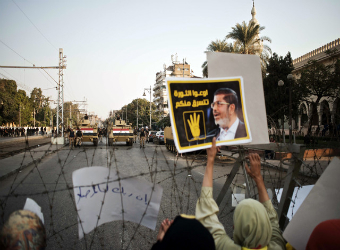Egypt puts former President Mohamed Morsi on trial today in a case that threatens to ignite new violence in a nation that’s become even more deeply riven since his overthrow.
The passions inflamed by both Morsi’s presidency and his July 3 removal by the military flared again ahead of the trial, which the army-backed government may try to use to legitimize his ouster. Backers of the man whose presidency transformed the once-persecuted Muslim Brotherhood into Egypt’s power broker say the trial is politically tinged and have called protests.
In that charged atmosphere, many fear that Egypt will be convulsed by a new round of clashes between Morsi loyalists who want him reinstated and security forces who have killed hundreds of his supporters and thrown dozens of Islamist leaders into jail since he was forced from power.
“When the trial starts, there definitely will be violence,” said Ziad Akl, a senior researcher at the Ahram Center for Political and Strategic Studies in Cairo.
“The interim authorities — the army and the interim government — are counting on Morsi’s trial to seem more legitimate” and to “further demonize the image of Morsi’s administration,” Akl said. “Putting Mohamed Morsi in a dock in a courtroom completely defies the idea that this man may still be the president.”
Morsi has been incarcerated and kept from public view since he was forced from power days after the first anniversary of his inauguration.
Coup Alleged
Supporters contend that Egypt’s first democratically elected civilian president was toppled in a coup and remains the country’s legitimate president. The government and its military backers say his ouster was an expression of the people’s will after days of protests against him.
The political instability generated by these dueling narratives has not swayed the interim government from its declared commitment to hold democratic elections next year. U.S. Secretary of State John Kerry, the highest-level American visit to the Egyptian capital since Morsi was toppled, urged the country’s officials yesterday to fulfill that promise.
Kerry also underscored the importance of reviving the Egyptian economy, which has struggled to lure back tourists and investors who first fled amid the turmoil surrounding the 2011 ouster of longtime leader Hosni Mubarak.
In a sign of the fraught atmosphere, the Interior Ministry warned that forces would confront any attempts to attack them or vital installations. More than 20,000 ministry forces will secure the trial, and a military helicopter is expected to transfer Morsi from the undisclosed location where he is held to the courtroom, the state-run Middle East News Agency reported.
Heavy Security
Mohamed el-Damaty, spokesman for the legal team representing defendants in the case, accused the government of deploying excessively heavy security to whip up fear.
“The putschists are trying with all force to thwart the movement on the street,” he added.
Today’s hearing will be “procedural” and the defense team will ask the court for time to review documents and to meet with Morsi, he said.
The charges date back to violence that erupted during protests against Morsi outside the Ittihadiya palace last year. Some of the defendants are accused of holding 60 people hostage and torturing them. Morsi is charged with incitement that led to the killings of three people.
Sahar Abdel-Mohsen, who says she was at the palace, described it as “one of the darkest days of my life.”
No Sympathy
“Morsi killed innocent people, silenced the voice of opposition just like any dictator,” said the architect, who voted for Morsi before becoming disillusioned by his policies. “Morsi and his group gave us no reason to sympathize with them.”
Loyalists and others have questioned whether Morsi will be given a fair trial. The judicial system was repeatedly at loggerheads with him during his year in office, and his Islamist backers claim court benches are stacked against them.
“The former president is being tried on criminal charges rather than political ones” and he “enjoys his full legal rights,” a government statement said.
“Tomorrow’s trial is a test for the Egyptian authorities,” Hassiba Hadj Sahraoui, deputy director for the Middle East and North Africa program at Amnesty International, said in a statement. “They should present Mohamed Morsi in court and grant him a fair trial, including the right to challenge the evidence against him in court. Failing to do so would further call into question the motives behind his trial.”
Source: Bloomberg
